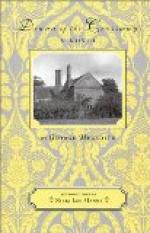He pointed to a half-open one, with the petals in disparting pointing to junction, and compared it to the famous tiptoe ballet-posture, arms above head and fingers like swallows meeting in air, of an operatic danseuse of the time.
‘I do not see it, because I will not see it,’ she said, and she found a personal cooling and consolement in the phrase.—We have this power of resisting invasion of the poetic by the commonplace, the spirit by the blood, if we please, though you men may not think that we have! Her alarmed sensibilities bristled and made head against him as an enemy. She fancied (for the aforesaid reason—because she chose) that it was on account of the offence to her shy morning pleasure by his Londonizing. At any other moment her natural liveliness and trained social ease would have taken any remark on the eddies of the tide of converse; and so she told herself, and did not the less feel wounded, adverse, armed. He seemed somehow—to have dealt a mortal blow to the happy girl she had become again. The woman she was protested on behalf of the girl, while the girl in her heart bent lowered sad eyelids to the woman; and which of them was wiser of the truth she could not have said, for she was honestly not aware of the truth, but she knew she was divided in halves, with one half pitying the other, one rebuking: and all because of the incongruous comparison of a wild flower to an opera dancer! Absurd indeed. We human creatures are the silliest on earth, most certainly.
Dacier had observed the blush, and the check to her flowing tongue did not escape him as they walked back to the inn down the narrow street of black rooms, where the women gossiped at the fountain and the cobbler threaded on his doorstep. His novel excitement supplied the deficiency, sweeping him past minor reflections. He was, however, surprised to hear her tell Lady Esquart, as soon as they were together at the breakfast-table, that he had the intention of starting for England; and further surprised, and slightly stung too, when on the poor lady’s, moaning over her recollection of the midnight Bell, and vowing she could not attempt to sleep another night in the place, Diana declared her resolve to stay there one day longer with her maid, and explore the neighbourhood for the wild flowers in which it abounded. Lord and Lady Esquart agreed to anything agreeable to her, after excusing themselves for the necessitated flight, piteously relating the story of their sufferings. My lord could have slept, but he had remained awake to comfort my lady.
‘True knightliness!’ Diana said, in praise of these long married lovers; and she asked them what they had talked of during the night.
‘You, my dear, partly,’ said Lady Esquart.
‘For an opiate?’
‘An invocation of the morning,’ said Dacier.
Lady Esquart looked at Diana and, at him. She thought it was well that her fair friend should stay. It was then settled for Diana to rejoin them the next evening at Lugano, thence to proceed to Luino on the Maggiore.




